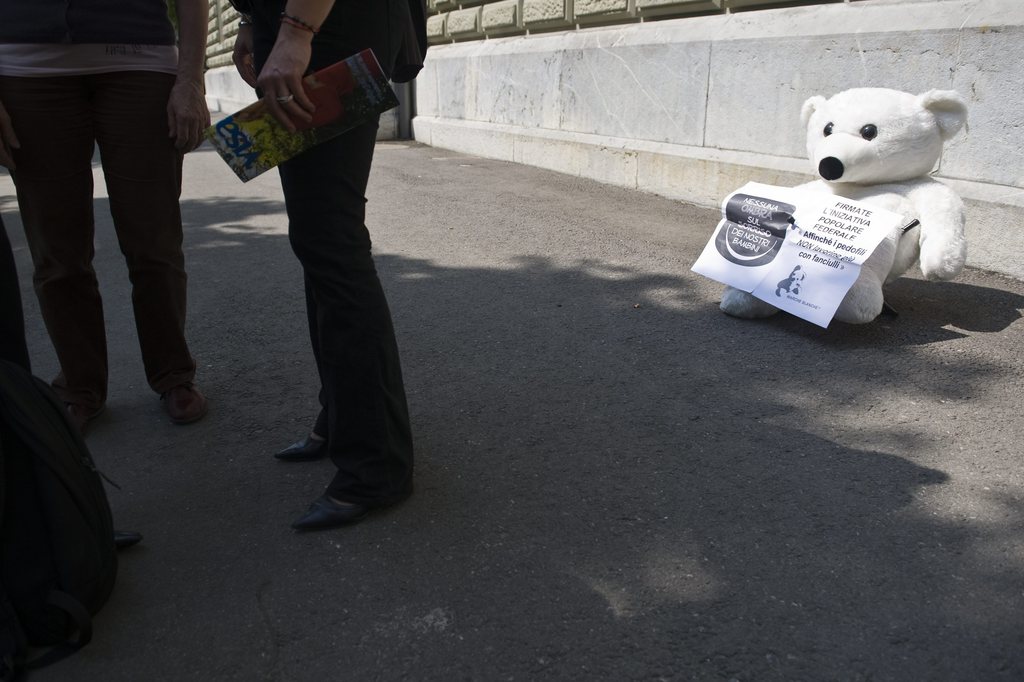Voters back paedophile ban on working with children

An initiative to ban convicted paedophiles from working with children for life has been approved by Swiss voters. The ballot on Sunday ends a bitter and divisive debate wherein both sides claimed their position delivered better protection for children.
Final results showed 63.5% of voters were in favour of the initiative. It also won the necessary backing of a majority of cantons. Turnout was 55.5%.
Opponents, including the cabinet, had claimed the text was too simplistic and made redundant by a new law which comes into force in January.
But supporters dismissed these reservations, arguing that the initiative text would tighten the new law while sending out a strong signal of zero tolerance for sex crimes against children.
The initiative, brought by the Marche Blanche (White March) group of concerned parents, sought to amend the Swiss constitution to include the following wording: “Persons who are convicted of breaching the sexual integrity of a child or a dependent person permanently lose the right to pursue a professional or volunteer activity with minors or dependants.”
PLACEHOLDERThe head of the Marche Blanche movement, Christine Bussat, said she was relieved by the outcome, accusing opponents of having “used lies” to push their case.
Meanwhile Christa Markwalder of the “No” campaign said she was disappointed but not surprised by the results. Their campaign had been a difficult one to lead, as “the title of the initiative was very populist”. The other side had managed to give the “false impression that parliament was not proactive in this field”, she noted.
Meanwhile, Justice Minister Simonetta Sommaruga said the initiative violated the constitution, making its implementation difficult. She announced proposed legislation would be presented this year.
But parliament will be facing a dilemma, she said. Either it sticks to the wording of the initiative and violates the principle of proportionality, or it veers away from the text approved by voters and runs counter to the original meaning of the initiative. (See related story)
At this point in time, Sommaruga said, it is impossible to see in which direction parliament will choose to go.

More
And if voters are not always right?
Party divide
Most of the mainstream parties – the centre-right Christian Democrats, centre-right Radicals, centre-left Social Democrats, the Greens and Liberal Greens – came out against the initiative. The rightwing Swiss People’s Party and the small Conservative Democratic Party, a relatively new party made up mainly of former People’s Party members, campaigned in favour of the work ban.
Representatives of civil society – for example teachers’ unions, scouting organisations and the umbrella group of youth and sports clubs – all rejected the initiative on the grounds that its scope is inadequate and the mandatory work ban is unconstitutional.
These groups feared the work-ban would create a false sense of security and detract from more effective child protection measures. They expressed support for the scheduled legislation, which also covers non-sexual violence against children.
The campaign to impose a work ban for life for convicted paedophiles grew from a small local story in the bilingual town of Biel which took place in 2004.
The case involved a teacher who had been convicted of child sexual abuse. After completing his sentence, he successfully applied for a teaching job in the town working with children aged around 13.
When word got out, Marche Blanche organised a protest march and a petition calling for the man’s dismissal. But the school board defended its decision, arguing that he had been the best candidate for the job.
The cause was then taken up by two politicians but failed to gain any traction in parliament. After waiting for the two unsuccessful parliamentary initiatives to run their course, Marche Blanche decided to take the issue to the people, finally handing in the required signatures in April 2011 to force a nationwide vote.
Marche Blanche has convinced voters on child-protection issues before, most recently in 2008 when 52% of the electorate accepted a proposed constitutional amendment to remove the statute of limitations for sexual or pornographic acts committed against children under 12. Before then, victims had until the age of 25 to take legal action.
Controversy
This national vote is the culmination of a ten-year campaign sparked by the controversial re-hiring of a teacher in the town of Biel who had previously been convicted for committing sexual offences against children in his care (see infobox).
Switzerland’s criminal justice system has a “second chance” approach and most first-time offenders receive fines or suspended sentences.
There is no national register of sex offenders and police clearance is not a blanket requirement for jobs and volunteer activities involving contact with children and adolescents.
Campaigners worried that imposing a mandatory work ban for life for all child sex crimes, including less serious offences, would disempower judges and undermine a basic principle of the justice system, treating every case individually.
Nationwide minimum wage
Yes: 23.7% No: 76.3%
Gripen fighter jets
Yes: 46.6% No: 53.4%
Ban on convicted paedophiles
Yes: 63.5% No: 36.5%
Boost for family doctors
Yes: 88.0% No: 12.0%
Turnout: 55.5%
A limited number of voters, notably the Swiss Abroad, were able to cast their vote online as part of an ongoing trial with e-voting. About 16.6% of them made use of it.
Concerns were also raised that sexual contact between young people on either side of the age of consent (16), or the exchange of pornographic material between underage children risks falling under the terms of the work ban.
This is not an issue, according to the “yes” camp, who argued that the legislation which will be worked out based on the constitutional amendment will define the scope of the initiative fairly. “No” campaigners did not accept this as an adequate guarantee.
The Swiss criminal code already makes a distinction in cases of statutory rape when the age difference is less than three years. Judges have discretion to extend this gap when the defendant is under 20.
Bern: Nuclear power
63.3% of voters rejected a move to shut the Mühleberg nuclear power plant near Bern ahead of its planned closure in 2019.
Vaud: Heritage
A counter proposal to reduce the scale of the zones for building in the Lake Geneva region and to provide financial support to winegrowers to help maintain their terraces in Lavaux was approved by 68.5% of voters.
Neuchâtel: Wind power
Voters backed by 65% plans for five zones for wind farms comprising a total of 59 turbines, equal to 20% of the energy needs in canton Neuchâtel.
Better law?
One of the main arguments put forward by opponents of the initiative was that the work-ban issue had already been addressed, in a more reasonable way.
Under a revision to the penal code, passed by parliament in November 2013 and due to come into force on January 1 next year, judges will be able to use their discretion to impose a (potentially renewable) ten-year work ban on convicted offenders who receive a prison sentence of six months or more.
It is rare for people convicted of consuming child pornography or exhibitionist offences to cross that six-month threshold – a weakness in the law, said the “yes” campaign, while the “no” camp argued that the more severe restrictions were needed only for dangerous offenders.
Under the law, judges will have the power to forbid abusers from contacting victims and to declare certain public places off-limits to convicted paedophiles.
Supporters of the initiative, while satisfied with most aspects of the new law, did not want to leave work bans at the discretion of judges, pointing to the legal system’s historic reluctance to impose work bans.
Their trump card has been the oft-repeated question in this campaign: “Would you like your children to be in the care of a convicted paedophile?”
In 2013 there were 1,330 reported cases of sexual offences involving children in Switzerland, according to the Federal Statistics Office. The unreported incidence of child abuse is estimated to be much higher.
It is estimated that up to one in four women and one in ten men in Switzerland have experienced sexual abuse in their childhood. This includes one-off incidents and non-contact offences, such as exhibitionism.
Two-thirds of victims are girls, one third boys. The age group most affected is from seven to 12.
Some children experience this form of violence just once, others suffer repeated abuse, sometimes over years.
(Source: Swiss Child Protection Association)

In compliance with the JTI standards
More: SWI swissinfo.ch certified by the Journalism Trust Initiative














You can find an overview of ongoing debates with our journalists here . Please join us!
If you want to start a conversation about a topic raised in this article or want to report factual errors, email us at english@swissinfo.ch.